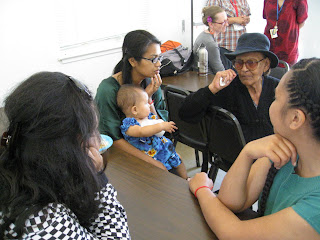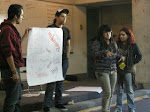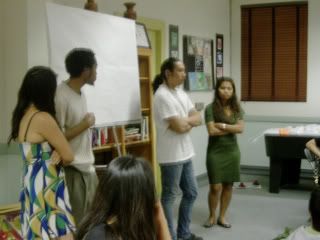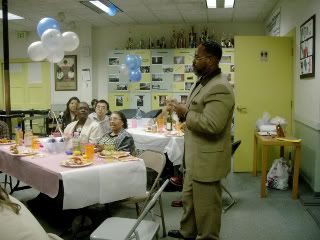 The Jam was the closing celebration for R2W. The participants organized the jam themselves. Jimmy Tsai and Martha Moung were the hosts. Local communities came to witness who the participants were and what they learned. Friends and families joined the jam and one of the participants families, Ronia Auelua, drove up from San Bernadino to support her. There was a lot of love in the room and the participants did an excellent job of representing and speaking their truths. Nina Autajay did a spoken word about gentrification in her hometown, Los Angeles. Fela Yepassis-Zembrou also did a spoken word about the crawls, Chinatown and Salinas, while his fellow comrades acted them out in a skit. Ravi Kong, a Resource Assistant for R2W this summer, led a cultural Cambodian dance. Music done by Ose Hosea, Victor McKaime, and Jimmy Tsai generated positive vibes throughout the room as they sang a song they composed called Stand Up. It was moving and uplifting to have these young leaders teach what they know. Friends, Family, and Alumni of R2W gave big props to the participants as the jam came to an end.
The Jam was the closing celebration for R2W. The participants organized the jam themselves. Jimmy Tsai and Martha Moung were the hosts. Local communities came to witness who the participants were and what they learned. Friends and families joined the jam and one of the participants families, Ronia Auelua, drove up from San Bernadino to support her. There was a lot of love in the room and the participants did an excellent job of representing and speaking their truths. Nina Autajay did a spoken word about gentrification in her hometown, Los Angeles. Fela Yepassis-Zembrou also did a spoken word about the crawls, Chinatown and Salinas, while his fellow comrades acted them out in a skit. Ravi Kong, a Resource Assistant for R2W this summer, led a cultural Cambodian dance. Music done by Ose Hosea, Victor McKaime, and Jimmy Tsai generated positive vibes throughout the room as they sang a song they composed called Stand Up. It was moving and uplifting to have these young leaders teach what they know. Friends, Family, and Alumni of R2W gave big props to the participants as the jam came to an end.The art group: Ale, Won, Hugo, Josh, Kim, and Lauren talking about the mural they painted.

R2W Alumni 06 Penitani Moa showing love to the participants.




 As we made our way to Pride, participants were anxious and excited to see the parade because it was the first time for many of them.
As we made our way to Pride, participants were anxious and excited to see the parade because it was the first time for many of them. R2W 2009 Participant Procter, a Tongan from Reno, Nevada, witnessing the parade for the first time.
R2W 2009 Participant Procter, a Tongan from Reno, Nevada, witnessing the parade for the first time.  R2W 2009 Participant Mele standing in solidarity for LGBTQ rights.
R2W 2009 Participant Mele standing in solidarity for LGBTQ rights.  "There is no judgement here today and everyone is able to express themselves freely,"-Nina.
"There is no judgement here today and everyone is able to express themselves freely,"-Nina. R2W Participants having a good time dancing through the streets of San Francisco.
R2W Participants having a good time dancing through the streets of San Francisco.

 Ravy then took us to Oak Park. She told stories of a family of 10 Cambodian refugees who lived in a one-bedroom apartment, moldy showers, and a landlord who raised the rent and disregarded tenants requests for repairs and remodeling because he reasoned that they were refugees and undocumented immigrants who were too scared of the legal system to take legal action. But the story didn't stop there. Ravy also shared the fight for safer and better living conditions that led to a lawsuit and the East Bay Asian Local Development Corporation buying the property, remodeling it with 1-4 bedroom units for families, making the rent affordable for working class families, and the creating a central courtyard, community garden, basketball court, and community room.
Ravy then took us to Oak Park. She told stories of a family of 10 Cambodian refugees who lived in a one-bedroom apartment, moldy showers, and a landlord who raised the rent and disregarded tenants requests for repairs and remodeling because he reasoned that they were refugees and undocumented immigrants who were too scared of the legal system to take legal action. But the story didn't stop there. Ravy also shared the fight for safer and better living conditions that led to a lawsuit and the East Bay Asian Local Development Corporation buying the property, remodeling it with 1-4 bedroom units for families, making the rent affordable for working class families, and the creating a central courtyard, community garden, basketball court, and community room.  After the tour, we broke bread with the community. We played basketball with some Oak Park youth on the court surrounded by another R2W alum from Oak Park, graffiti muralist Pat Kong.
After the tour, we broke bread with the community. We played basketball with some Oak Park youth on the court surrounded by another R2W alum from Oak Park, graffiti muralist Pat Kong. 








